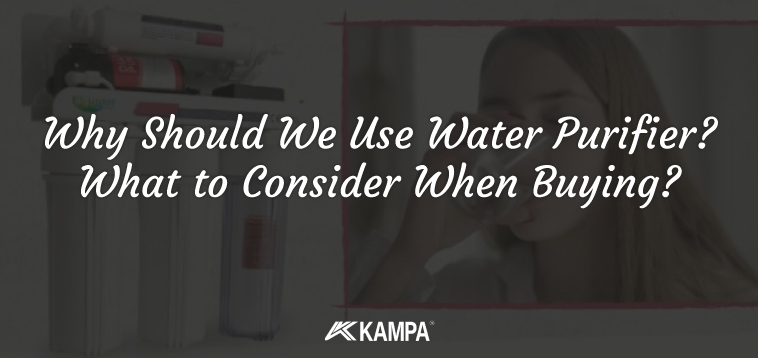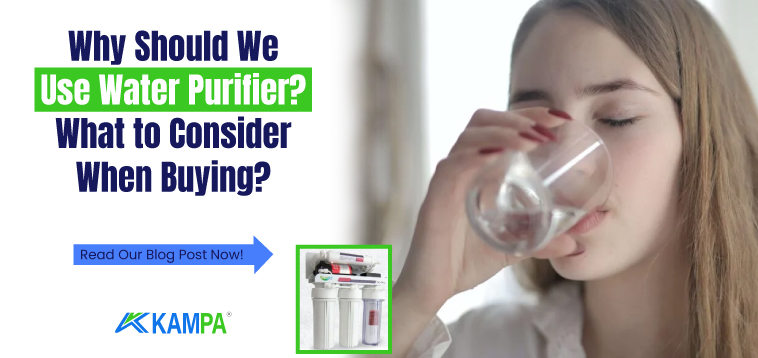Why Should We Use Water Purifier? What to Consider When Buying?
Table of Contents
What are the benefits and importance of water for our lives?
Water and water purifier is one of the most basic and indispensable substances that have a vital importance for our lives. Here are the benefits and importance of water in our lives:
- Supports basic vital functions.
- Maintains moisture balance in the body.
- It facilitates digestion.
- It removes toxic substances.
- Supports skin health.
- Improves focus and concentration.
- Improves exercise performance.
In summary, water is the basic source of life and is indispensable for our health, bodily functions and general well-being. Taking care to drink enough water on a daily basis is an important step towards maintaining a healthy life.

What are the benefits of water purifier?
- Health benefits: Water purifiers make drinking water safer and healthier by filtering harmful microorganisms, pollutants and chemicals in the water. Thus, water reduces the risk of spreading disease and prevents diseases that can be transmitted by water.
- Taste and odor improvement: Untreated water can sometimes have a bad taste and odor. Purifiers improve the taste and smell of water by removing unwanted substances from it.
- Improving water quality: Purifiers improve the quality of water in terms of color, appearance and clarity. This results in cleaner and more pleasant looking drinking water.
- Environmentally friendly: Purifiers reduce plastic bottle waste and non-recyclable packaging materials by reducing the use of bottled water. This helps to reduce negative impacts on the environment.
- Economic advantages: Using a water purifier at home saves money in the long run compared to buying bottled water or carboy water. Although the device has an initial cost, its long-term use can be more economical than continuous water purchase.
- Practical and convenient: Water purifiers can purify drinking water almost anywhere, so they can be easily used at home, at work or while traveling. By purifying mains water, it is possible to ensure constant access to clean water.
Do water purifiers really work?
With all these benefits in mind, water purifiers are an effective solution to achieve safer, cleaner and healthier drinking water. However, you can achieve different results depending on the type and functionality of the device. It is important to choose a water purifier that suits your needs.
Benefits of the right water treatment systems, Health, Economic and Quality We can collect under the headings,
- HEALTH: The waters coming out of the correct water treatment systems are the systems that allow the production of healthy water approved by the Ministry of Health, the World Health Organization and many tests and are produced using the latest technology. It also causes us to relax psychologically because we keep production under control.
- ECONOMY: Correct Water treatment systems Economically amortizes itself between 1 month and 12 months. It provides great savings from the first month to the budgets we allocate for water.Amortized in the following periods Healthy, Quality and Safe drinking water is used for free as long as we have the necessary annual maintenance.
- QUALITY: Correct Water treatment systems There are also benefits in terms of quality. Quality Water Odor, Color and Taste values such as values determined by the Ministry of Health remains within the rates. When the necessary annual maintenance is carried out together with the Technologies used in our systems, these ratios remain within the same values continuously.
In summary, a good water purifier, when used properly, can significantly improve the quality of drinking water and provide a healthier water consumption. However, care must be taken in the selection and maintenance of the device.

What Should You Pay Attention to When Buying a Water Purifier?
- (1.1)Filter Selection; The importance of the filter is very important when choosing awater purifier. Filters are one of the basic working principles of water purifiers and helps to remove contaminants in water. By retaining harmful substances in the water, filters allow you to get cleaner, healthier and safer drinking water.
- Removing contaminants: Filters physically or chemically trap bacteria, viruses, chemical contaminants, heavy metals and other unwanted substances in the water, ensuring clean water.
- Tat ve koku düzenleme: Aktif karbon filtreleri, suyun tadını ve kokusunu iyileştirerek daha hoş bir içme suyu elde etmenize yardımcı olur.
- Mineral protection: Water purifiers with quality filters ensure that minerals essential for the body remain in the water while removing harmful substances.
- Filter replacement: Filters should be changed regularly to maintain the effectiveness of water purifiers. Regular replacement of the filters helps to maintain the effectiveness of the device and ensure healthy and clean water.
- Water purification efficiency: Quality and appropriate filters increase the efficiency of the water purifier, resulting in higher quality water.
- Safety Filters provide reliable protection against contaminants and impurities in your water supply.
- When choosing a water purifier, factors such as the quality, type and frequency of filter replacement affect the performance of the device and the quality of the water. Choosing the right filters and changing them regularly is very important for you to get cleaner, healthier and safer drinking water.
2.Water Source: Determine your water source (city mains water, well water, pond water, etc.) and find out the quality of the water. The level of contamination in your water source will affect the treatment method you need and your choice of device.

3.Treatment Methods: Different treatment methods remove different contaminants. Research common treatment methods such as reverse osmosis, activated carbon filtration, ultraviolet sterilization and choose the one that suits your water source.
4.Tank Selection and Treatment Capacity: The daily treatment capacity of the device should be suitable for your family size and water consumption habits.
5.Pump Selection: The pump is used for water to flow from the faucet where water pressure values are low. In devices without a pump, the existing pressure of the water does this. If you live in a neighborhood with low water pressure, you should choose a device with a pump.
6.Quality and Brand of the Device: Choosing a reliable and high quality water purifier is important for a long-lasting and effective performance. Prefer well-known brands and certified products.
Remember, when buying a water purifier, it is important to choose a device that suits your needs and your water source. By comparing different options and getting the right information, you can find a quality and effective water purifier.
How many filters should the water purifier have?

The number of filters in water purifiers can vary depending on the type, brand and treatment method. In general, water purifiers can have between 3 and 7 filters. Each filter helps to remove different contaminants and purify the water.
For example, some water purifiers may use the following types of filters:
- Sediment Filter: Helps remove large particles and sediment from the water.
- Activated Carbon Filter: Regulates the taste and smell of water by removing chlorine, organic pollutants, taste and odor.
- Reverse Osmosis Membrane: Provides a high level of purification by removing small particles, bacteria, viruses and heavy metals from the water.
- Mineral Filter: Helps to add minerals back into the water after the purification process.
- 1st Stage: 5 micron Sediment filter; Removes all visible dirt, rust and sand particles. It regulates the taste and smell of water by removing elements such as chlorine, organic pollutants, taste and odor.
- 2nd Stage: Carbon block filter; Removes 99% of chlorine and organic chemicals. Removes taste, odor and color.
- 3rd Stage: 1 micron sediment filter; It increases the capacity of the membrane by filtering the water at 1 micron level before the membrane and extends its life.
- 4th Stage: RO Membrane filter; It performs microbiological and chemical treatment in water. It is a semi-permeable membrane filter with pores as small as one ten millionth of a millimeter. It filters the water at the molecular level and purifies the microbes, bacteria, heavy metals, minerals that give water hardness and all harmful substances in the water. It makes the water healthy, soft and mineral balanced.
- 5th Stage: Inline Post Carbon filter; It is developed from coconut shell. Inline post carbon filter gives the water a certain taste and drinking quality and makes the water ready to drink.
- 6th Stage: Mineral filter improves the qualities of clean water Calcium, Magnesium, Sodium, Potassium and other minerals found in many other readily available natural mineral waters are essential for proper human development and health. After this mineral filter, the water has a perfect and balanced ratio of minerals necessary for the healthy development of the human body.
The number of filters in the device can vary depending on your treatment needs and the level of contamination in your water supply. More filters usually provide more effective treatment, but maintenance of the device and filter changes also become more important.
Therefore, when choosing a water purifier, it is important to choose the device and the number of filters that suit your water source and purification needs.
How Should Water Purifier Plastic Quality Be?
The quality of the plastic material used in the water purifier is important. Here are the points to be considered about plastic quality:
- Food Grade Plastic: It is important that the plastic materials used in the water purifier are food grade. Food-grade plastics minimize the passage of harmful chemicals into the water when in contact with water and ensure drinking water safety.
- BPA and Phthalate Free: The plastic materials in the device must be free of harmful substances such as BPA (Bisphenol A) and phthalates. The transfer of such chemicals into water may pose a health risk.
- Durability: Quality plastic materials should be long-lasting and durable. This ensures trouble-free operation of the device for a long time.
- Easy Cleanability: It is important that plastic materials are easy to clean and hygienic. Regular cleaning of the water purifier is important for the cleanliness of the water.
- Should not affect water quality: Plastic materials should not adversely affect the water treatment process or the quality of the water.
The plastic quality of the device is a critical element for user health and the safety of drinking water. Therefore, when choosing a reliable and high quality water purifier, it is important to make sure that the plastic materials are food grade and free of harmful substances.
What is the difference between open case and closed case water purifier?
Right! In open case water purifiers, the internal mechanism and filters are visible, easily accessible but more exposed to external factors. In closed case devices, the internal mechanism is hidden, the filters are not visible from the outside and offer a more hygienic use. The choice depends on personal preferences and the area of use.
You can review our product recommendations by clicking on the link below. Click here for information about water purifiers.
🚩For product selection and offers;
📳 05495413607
📧 dijital@kampacompany.com
✅ KAMPA ADDS VALUE …

